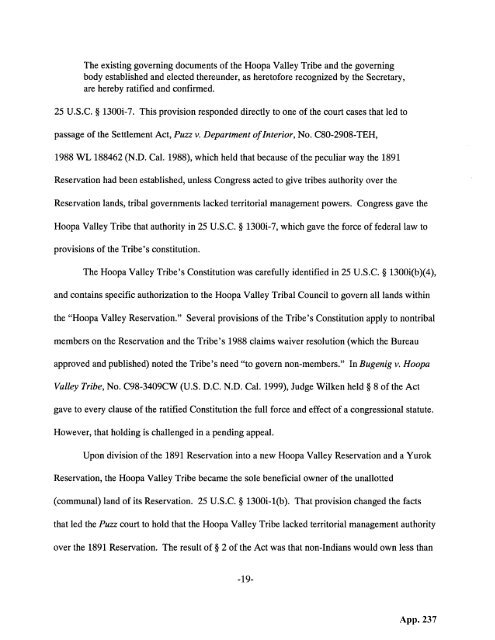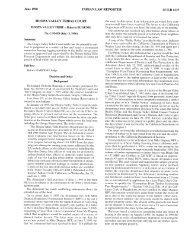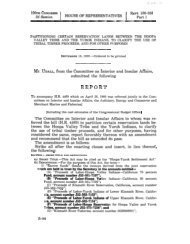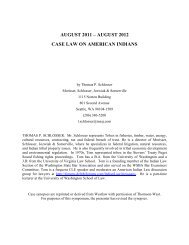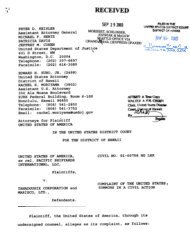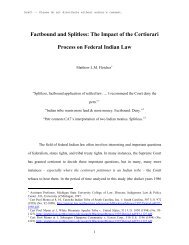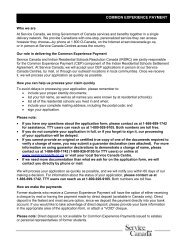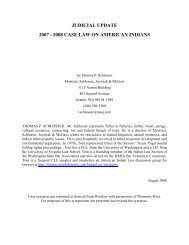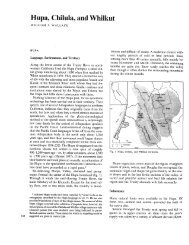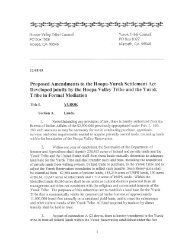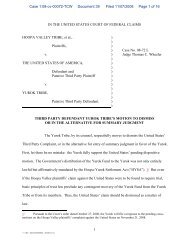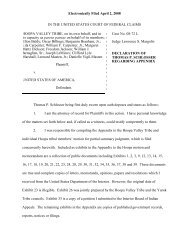Hoopa appendix supporting summary judgment - Schlosser Law Files
Hoopa appendix supporting summary judgment - Schlosser Law Files
Hoopa appendix supporting summary judgment - Schlosser Law Files
You also want an ePaper? Increase the reach of your titles
YUMPU automatically turns print PDFs into web optimized ePapers that Google loves.
The existing governing documents of the <strong>Hoopa</strong> Valley Tribe and the governing<br />
body established and elected thereunder, as heretofore recognized by the Secretary,<br />
are hereby ratified and confirmed.<br />
25 U.S.C. § 1300i-7. This provision responded directly to one of the court cases that led to<br />
passage of the Settlement Act, Puzz v. Department ofInterior, No. C80-2908-TEH,<br />
1988 WL 188462 (N.D. Cal. 1988), which held that because of the peculiar way the 1891<br />
Reservation had been established, unless Congress acted to give tribes authority over the<br />
Reservation lands, tribal governments lacked territorial management powers. Congress gave the<br />
<strong>Hoopa</strong> Valley Tribe that authority in 25 U.S.C. § 1300i-7, which gave the force of federal law to<br />
provisions of the Tribe’s constitution.<br />
The <strong>Hoopa</strong> Valley Tribe’s Constitution was carefully identified in 25 U.S.C. § 1300i(b)(4),<br />
and contains specific authorization to the <strong>Hoopa</strong> Valley Tribal Council to govern all lands within<br />
the “<strong>Hoopa</strong> Valley Reservation.” Several provisions ofthe Tribe’s Constitution apply to nontribal<br />
members on the Reservation and the Tribe’s 1988 claims waiver resolution (which the Bureau<br />
approved and published) noted the Tribe’s need “to govern non-members.” In Bugenig v. <strong>Hoopa</strong><br />
Valley Tribe, No. C98-3409CW (U.S. D.C. N.D. Cal. 1999), Judge Wilken held § 8 of the Act<br />
gave to every clause of the ratified Constitution the full force and effect of a congressional statute.<br />
However, that holding is challenged in a pending appeal.<br />
Upon division of the 1891 Reservation into a new <strong>Hoopa</strong> Valley Reservation and a Yurok<br />
Reservation, the <strong>Hoopa</strong> Valley Tribe became the sole beneficial owner of the unallotted<br />
(communal) land of its Reservation. 25 U.S.C. § 1300i-1(b). That provision changed the facts<br />
that led the Fuzz court to hold that the <strong>Hoopa</strong> Valley Tribe lacked territorial management authority<br />
over the 1891 Reservation. The result of § 2 of the Act was that non-Indians would own less than<br />
-19-


